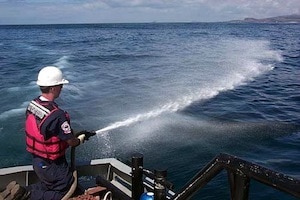A new report on the Gulf of Mexico oil disaster of 2010 is providing adequate cause for concern for residents and clean up workers along the Gulf Coast. The report from EarthJustice reveals that Corexit, the oil dispersant used by BP to aid in oil cleanup, is laden with cancer-causing chemicals.
The dispersant Corexit was dumped into the oil-stained waters of the Gulf of Mexico to help the oil coagulate and sink to the sea floor. Once the oil clumps reached the bottom, it was believed that they would disintegrate into the water, no longer posing a threat to marine life. But as EarthJustice’s report shows, the threat lingered.
An estimated 1.8 million gallons of Corexit were dumped into the Gulf of Mexico in an attempt to displace the 206 million gallons of oil that spewed from a broken well-head on the Gulf floor. And while the dispersant itself was ruled to be less toxic than the oil, the study suggests that the combination mixture of crude oil and dispersant poses a significantly greater threat to both the environment and marine life than either substance on its own. The EPA says that studies have been done on some of the 57 chemical agents found in dispersants, but they also acknowledge that no long term studies have been conducted on the exposure to these chemicals in quantities as large as were poured into the Gulf.
Cynthia Sarthou, executive director of the Gulf Restoration Network, says that lab studies have shown that the chemicals in Corexit have caused cancer, eye irritation, and respiratory problems in lab rats.
But this is not new information. BP knew that Corexit was not the best choice in oil dispersants, but chose to use that chemical anyway. Studies by the EPA showed that Corexit was far less effective on the type of crude oil that was leaking from BP’s broken well, and there were in fact at least 12 other dispersants that would have worked better. Those same studies also showed that the other 12 more effective dispersants were also less toxic than Corexit.
Think Progress points out that the choice to use Corexit instead of more effective, less toxic competitors could easily stem from the fact that the company that produced Corexit, Nalco, was formerly owned by Exxon and the leadership for the company includes executives from both Exxon and BP.
The EPA had originally ordered BP to use a different dispersant, but backed off their order due to insistence from the company. And as if the health dangers from the use of Corexit weren’t bad enough, the evidence is readily available to show us that the dispersant didn’t even work. According to the Associated Press, tar balls are continuing to wash up all along the Gulf Coast, even though the dispersant was supposed to help the oil break down and get reabsorbed back into the water. The AP report says that the tar balls coming ashore in September – a full 14 months after the oil leak was sealed – have remained “chemically” the same, meaning that no breakdown has occurred.
As long as the oil-dispersant mix lingers in the Gulf of Mexico, so will the health and environmental threats posed by the chemical soup. Health problems are already popping up along the Gulf Coast, and it is unlikely that they will subside any time soon.
Subscribe to our newsletter
Stay up to date with DeSmog news and alerts






